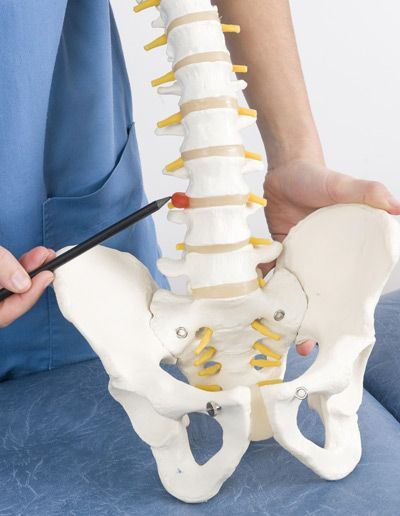Herniated Disc Treatment NYC - Dr. Alicia Armitstead
"Herniated discs do not self-heal. Over time, the problem worsens, and its effects become more severe. Without treatment, the pain people experience can also worsen and make it difficult or impossible to manage daily life."
Dr. Alicia Armitstead
Fast Pain Relief from Herniated Discs at the Healing Arts NYC Health and Wellness Center in Manhattan NY 10017 and Connecticut
What is a Herniated Disc?
The vertebrae in the spine have rubbery cushions that divide and protect them. The cushions are discs with a durable outer surface and a jellylike center. A herniated or ruptured disc is when one of these cushions slips out of place and pushes through the outer rubbery surface. The event can occur at any time, and it is not always immediately noticeable to the individual experiencing it when it happens. A herniated disc can occur in the neck or back.
Common Symptoms of a Herniated Disc
The symptoms of a herniated disc depend on the location of the injury. A problem in the lower back will more likely cause pain in that area and extend to the buttocks and legs. Herniated discs in the neck can cause radiating pain across the shoulders and into the arms. The pain can feel like a sharp and stabbing sensation, or people may experience a burning discomfort.
When the problem becomes prominent enough to affect the arms or legs, people often feel numbness and tingling in the affected extremities. The pressure on nearby nerves can also cause additional pain and weakness in the muscles associated with the nerves.
Common Causes of a Herniated Disc
Age plays a role for many people as the material in the discs degenerates over time. The problem can occur even without degeneration if someone twists or strains the back a certain way. Some people are genetically predisposed, as herniated discs often run in families. Another risk factor that can increase the chances of a herniated disc include people who carry excess weight, particularly in the abdominal area. Additional risk factors include:
- Physically strenuous jobs
- Activities that involve a lot of twisting or lifting
- Smoking
- Extended periods of driving
- Sedentary lifestyles
How Does Chiropractic Treatment for a Herniated Disc Work?
Treatment for a herniated disc involves addressing the inflammation in the area to allow the disc to slip back into place. Dr. Alicia Armitstead uses various therapies to reduce inflammation. The doctor will also use methods like flexion distraction for patients experiencing extreme pain. The pain occurs because the disc ruptures far enough to press on a nerve. By moving the disc away from the nerve, the pain subsides.
Patients with a herniated disc may need multiple treatments to guide the disc back in place. The maintenance and preventative treatments begin after the inflammation subsides, nerve pain is under control, and the disc is aligned.
Many patients, particularly those with a genetic predisposition to the injury, will benefit from lifestyle changes. Nutritional supplementation can help the body strengthen, reduce or eliminate chronic inflammation, and help people achieve a healthy weight.
Learning to move and lift safely can also reduce the risk of re-injury. Safe, monitored exercise programs can help people avoid a sedentary lifestyle and strengthen their muscles. Quitting smoking becomes a necessity. Nicotine causes cell damage that increases disc degeneration. Exposing the body to the carbon monoxide in cigarettes prevents the discs from absorbing nutrients effectively. Poorly nourished discs lose flexibility, and the chance of a rupture increases.
What Happens if a Herniated Disc Remains Untreated?
Herniated discs do not self-heal. Over time, the problem worsens, and its effects become more severe. Without treatment, people may lose control of their bowels or bladder. A condition known as saddle anesthesia can develop. Saddle anesthesia is when the areas touching a saddle while mounted on a horse lose feeling because of nerve damage. The loss of sensation in the lower extremities can make people more clumsy and more likely to injure themselves in a fall.
The pain people experience can also worsen and make it difficult or impossible to manage daily life. The area where the pain occurs can also change or spread. The pressure placed on a nerve can cause miscommunication in nerve signals, and this can account for the change in pain locations. If allowed to continue for too long, the ruptured disc can cause soft tissue damage in the surrounding area. The damage can become too severe to treat in any way other than surgery. Not all nerve damage may reverse after surgery and could become permanent.

Contact Dr. Alicia Armitstead of Healing Arts NYC To Schedule A Herniated Disc Treatment
As a leading NYC herniated disc chiropractor, Dr. Alicia Armitstead knows that every patient has a unique challenge when they experience a herniated disc. The pain, numbness, and fear of lasting damage can cause extreme stress for anyone.
Chiropractic treatment can restore independence and take away the pain and worry. The process begins with a consultation and a complete examination. Do not wait any longer. Contact the office today to schedule a visit.
Please contact us today!
Additional References
- What is a Herniated Disc - Mayo Clinic
- Chiropractic Care and Herniated Discs - Health Central



